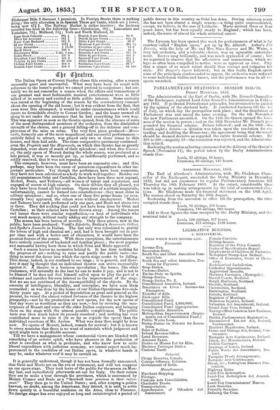t4t Cbtatrts.
The Italian Opera at Covent Garden closes this evening, after a season unusually quiet and uneventful. What may have been its result with reference to the lessee's pocket we cannot pretend to conjecture ; but cer- tainly we do not remember a season when the affairs and transactions of our greatest and most fashionable musical entertainment were so little talked of in society and excited so little public interest. Some curiosity was raised at the beginning of the season by the contradictory rumours
about the opening of the old house; but it was evident from the first, that even were this attempted, it would be under circumstances which could about the opening of the old house; but it was evident from the first, that even were this attempted, it would be under circumstances which could
create no formidable rivalry to Covent Garden ; and the lessee seemed all along to act under the assurance that he had everything his own way. This was apparent as soon as the theatre opened, from the absence of some of the most distinguished members of the orchestra, from the diminished strength of the chorus, and a general falling-off in the richness and com- pleteness of the mise en scene. The very first piece produced—Afesa-
niello, formerly one of the most magnificent and successful performances—
entirely failed to attract, was played only two or three times to thin houses, and then laid aside. The same comparative parsimony continued :
oven the Prophete and the Huguenots, on which this theatre has so greatly depended, were shorn of much of their splendour ; and when Don Giovan- ni, the only opera of Mozart during the whole season, was produced at a late period, it was so meanly got up, so indifferently performed, and so colcfly received, that it was not repeated.
The company, however, must have been an expensive one ; and this, perhaps, may have been the cause of penurious expenditure in other im- portant particulars. Yet though the performers have been numerous, they have not been calculated as a body to work well together. Besides our old. acquaintances Grisi and Castellan, there have been three new soprani, Medori, Rosie, and Tedesco,—all women of talent and reputation, and engaged of course at high salaries. On their debuts they all pleased, yet they have been found all but useless. Opera stars of a certain magnitude, unfortunately, cannot be formed into constellations—they must shine in solitary splendour ; and so, when one of these five prime donne (or occa- sionally two) appeared, the others were without employment. Medori and Tedesco have each performed only one part, and Bosio not above two or three. They did nothing that could not have been done by Grisi and Castellan ; so their salaries have been thrown aWay. Among the tenors and basses there were similar superfluities,—a host of individuals who cost much money, without really adding any strength to the company.
The season has been barren of novelty. Only three pieces, new to the public, have been produced : Verdi's Rigoletto, Berlioz's Benvenuto Cellini, and Spohr's fessoncia in Italian. The last only was calculated to gratify
the lovers of high and classical art ; and, had it been brought out in pro- per time and with a better cast of characters, it would have been the greatest feature of the season. With these exceptions, the entertainments have entirely consisted of hacknied and familiar pieces ; the most popular and successful having been those in which Grisi and Mario appeared.
Such a season leaves no memories behind it. It has done nothing for the progress of art—nothing to raise and purify the public taste—no- thing to arrest the decay into which the opera stage seems to be falling.
This decay, indeed, is not confined to our stage ; it is general, and there- fore it may be thought that no individual theatre can strive successfully
against it. A theatre is a business speculation ; the lessee, like other tradesmen, will naturally do the best he can to make it pay, and is not to be blamed if he does not feel himself called upon to play the part of a reformer and sacrifice his own interest to the improvement of the stage. But we are not convinced of the incompatibility: of the objects. By the exercise of intelligence, liberality, and enterprise, we have seen them reconciled ; as was done by the lessee of our Italian Operahouse five-and. thirty years ago. At a period of degradation as great and general as the present, he raised the almost ruined fortunes of the theatre to the highest prosperity,—not by the production of new operas, for the new operas of that day were as worthless as they are now,—but by reviving the mas- terpieces of Mozart and Some of the older Italian composers, and bringing them on the stage with the utmost possible completeness. The public taste was then much below its present standard ; and nothing has ever contributed more to raise it (in so far as regards the opera) than the individual exertions of Mr. Ayrton. What was done then might be done now. No operas of Mozart, indeed, remain for revival ; but it is known to every musician that there is no want of materials which judgment and spirit might turn to profitable account. , Till we have a management whose commercial views are blended with something of an artistic spirit, who have pleasure in the production of what is excellent as what is profitable, and who know how to unite liberal expenditure with judicious economy, we cannot expect much im- provement in the condition of our Italian opera, in whatever hands it may be, under whatever roof it may be carried on.


























 Previous page
Previous page